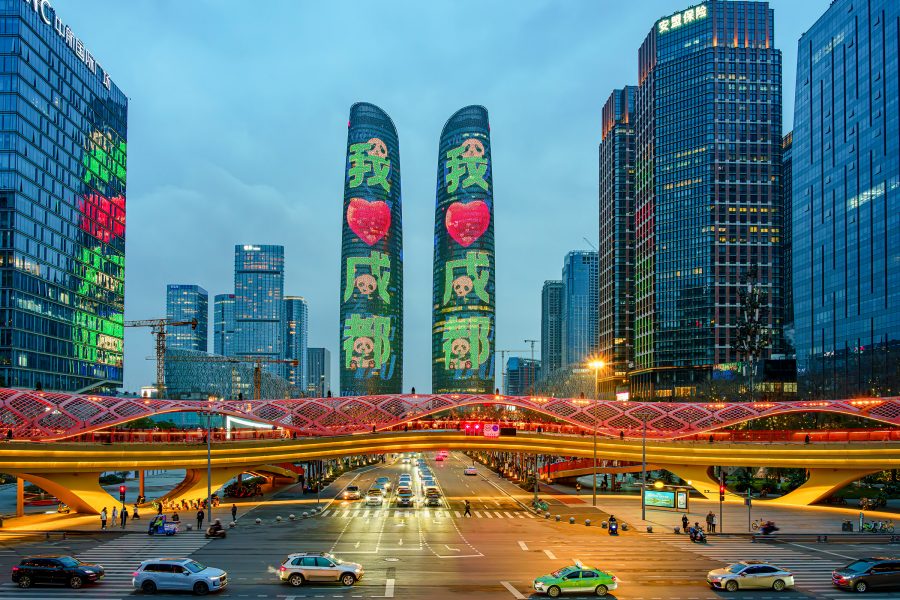Home to giant pandas and addictively spicy food, Chengdu has long held major tourist appeal (which you can read more about in our local’s guide to Chengdu). But more recently, the capital of Sichuan province has emerged a business hub, becoming one of the Chinese Mainland’s new first-tier cities and among its fastest growing. Two international airports and an extensive rail network make it exceedingly well-connected, while the introduction of a Free Trade Zone has boosted foreign investment.
If you’re heading to Chengdu to make the most of its business opportunities, here’s everything you need to know ahead of your trip.
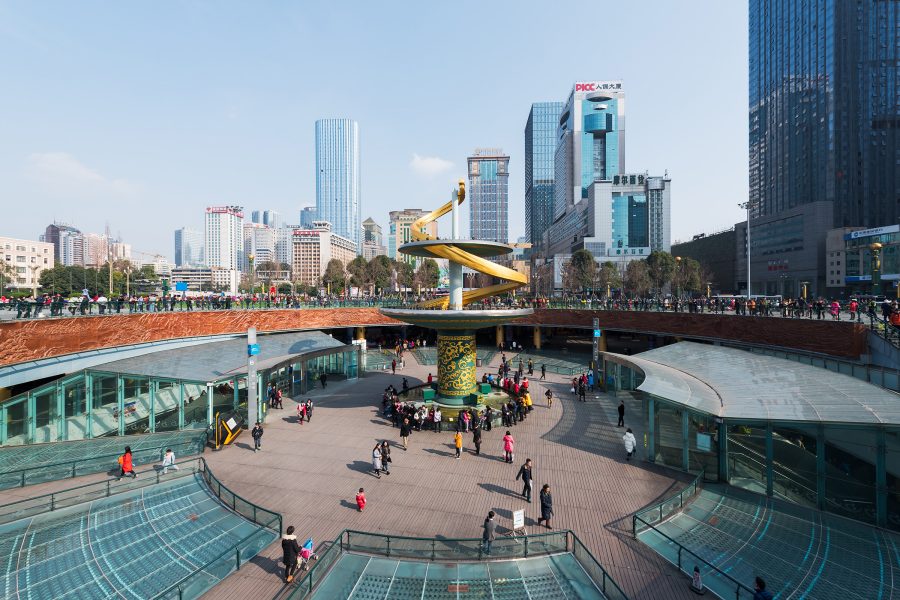
Credit: plej92/Getty Images

Credit: VCG/Getty Images

Credit: VCG/Getty Images
Where to start
Chengdu is arranged in concentric circles, with Tianfu Square at its centre and four ring roads radiating out. Everything within the first two ring roads is considered the city centre. It’s where you’ll find most of the city’s leisure attractions and smaller businesses. Meanwhile, most multinationals and corporate headquarters are clustered around Tianfu New Area, Century City and the High Tech Zone – all of which are to the south of the centre, beyond the third ring road.
To get around, make use of Chengdu’s extensive and efficient Metro network. Line 1 connects the city centre to the southern business hub, and you can buy single-journey tickets at any Metro station. For ride hailing, use Didi. It’s also a good idea to download Baidu Maps or Amap to help you navigate.
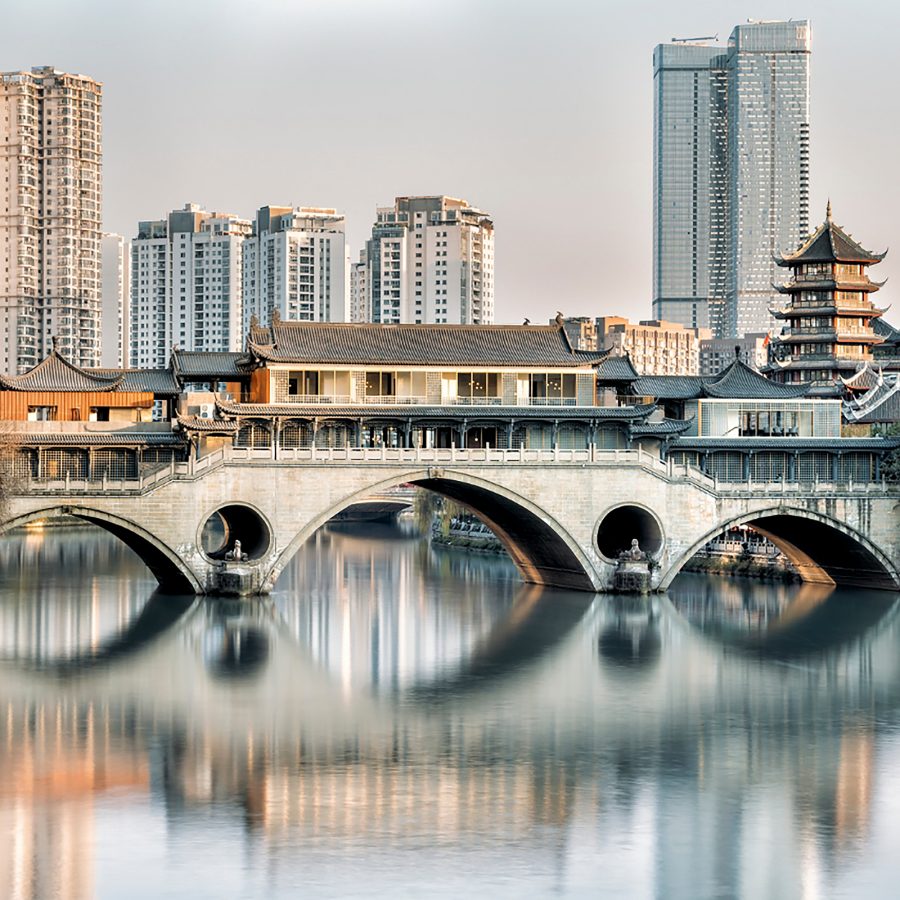
Credit: Eric Miller
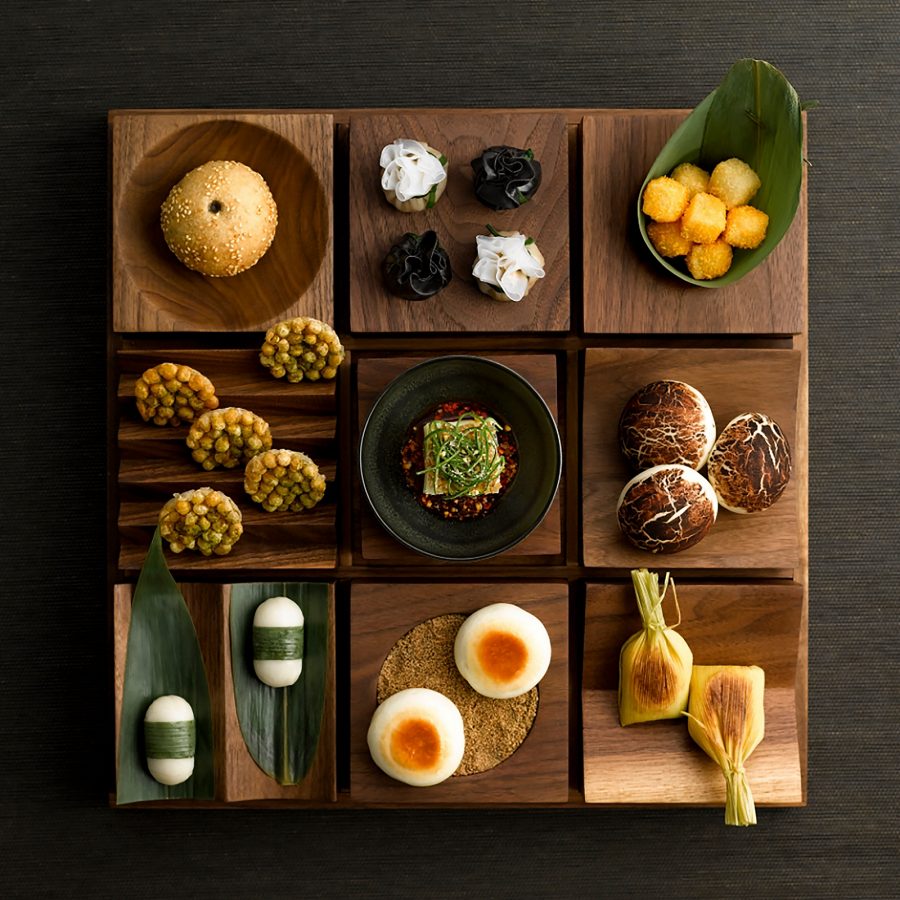
Credit: Eric Miller
Where to take clients
A little pomp and ceremony go a long way when doing business in the Chinese Mainland, so private dining rooms are recommended. Note that most restaurants do not offer a smoke-free environment, so inquire ahead if this is important.
Xin Rong Ji and Yu Zhi Lan (24 Changfa Street) – holding one and two Michelin stars, respectively – will effortlessly impress. The former is a spot in the financial district specialising in seafood while the latter is a destination restaurant known for its playful Chinese tasting menu. Acclaimed chef Andre Chiang’s The Bridge is worth a visit, serving innovative Sichuan fare atop the historic Anshun Bridge. For an exceptional experience, book a room at Zi Fei’s Lu Lake outpost, where the refined banquet is accompanied by live performances of Chinese classical music and lakeside views.
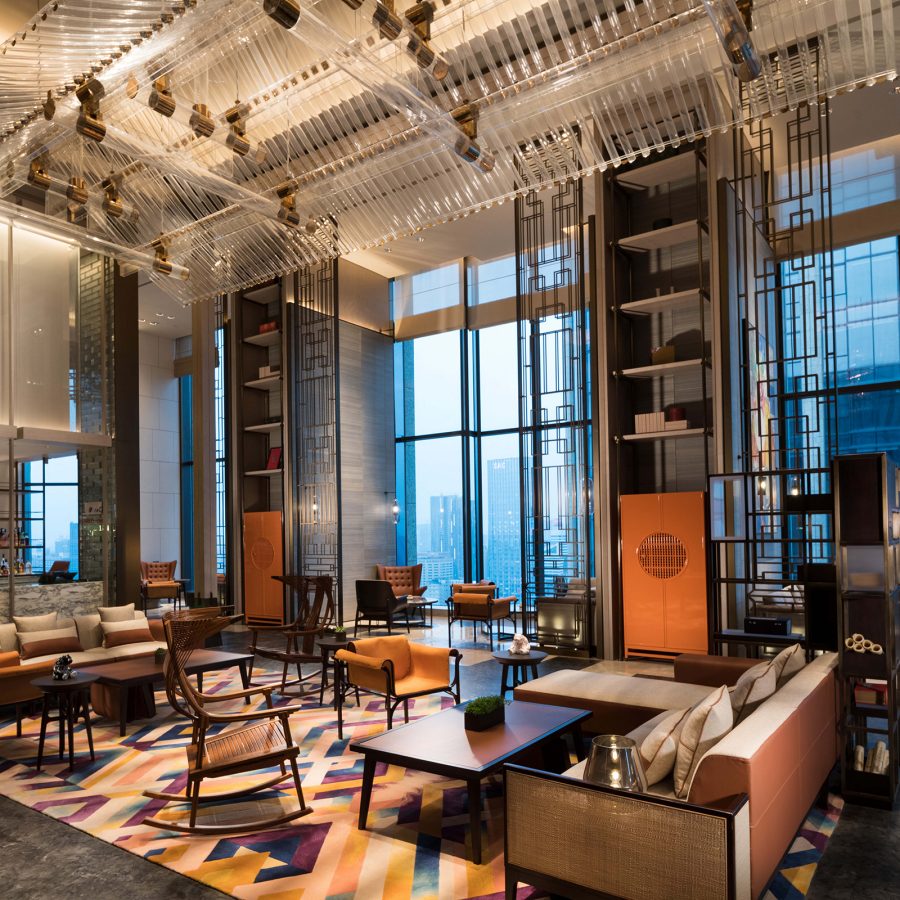
Credit: Canopy by Hilton Chengdu City Centre

Credit: InterContinental Century City Chengdu
Where to stay
If you’re planning to go sightseeing, make sure you’re based centrally. Canopy by Hilton Chengdu City Centre puts you within walking distance of the city’s museums and the much-loved People’s Park. Dorsett Chengdu is a well-priced alternative – it’s still centrally located, although you’ll need to hop into a taxi or take public transport to get around.
To the south, InterContinental Century City Chengdu is near the city’s main exhibition centre.

Credit: Lane Oatey/Blue Jean Images/Getty Images
What to say
You’ll get kudos just for mastering the pronunciation of “ni hao” (hello) and “xie xie” (thank you), but you’ll be an even bigger hit if you say them in the local Sichuan dialect. Otherwise, ask for recommendations on where to eat or what to see – Chengduers love to show off their city.

Credit: BJI/Blue Jean Images/Getty Images
What to know
As well as a small gift, it’s worth taking business cards with you – but don’t be surprised if your associate suggests connecting on WeChat instead, so be sure to have this ready. In any case, you’ll want to set up either WeChat or Alipay on your phone. Both e-wallet apps can be used to pay for almost all goods and services, inclulding ride hailing and booking train tickets.
In addition, ensure you get an e-SIM for your trip. Although free Wi-Fi is everywhere, most services require a Chinese phone number to connect.
Finally, English is widely taught in schools but foreign language abilities can vary enormously, so having a translator or using a translation app may be helpful.
Still have questions? Check out our handy article on requirements for travelling to the Chinese Mainland.

Credit: Philippe LEJEANVRE/Getty Images
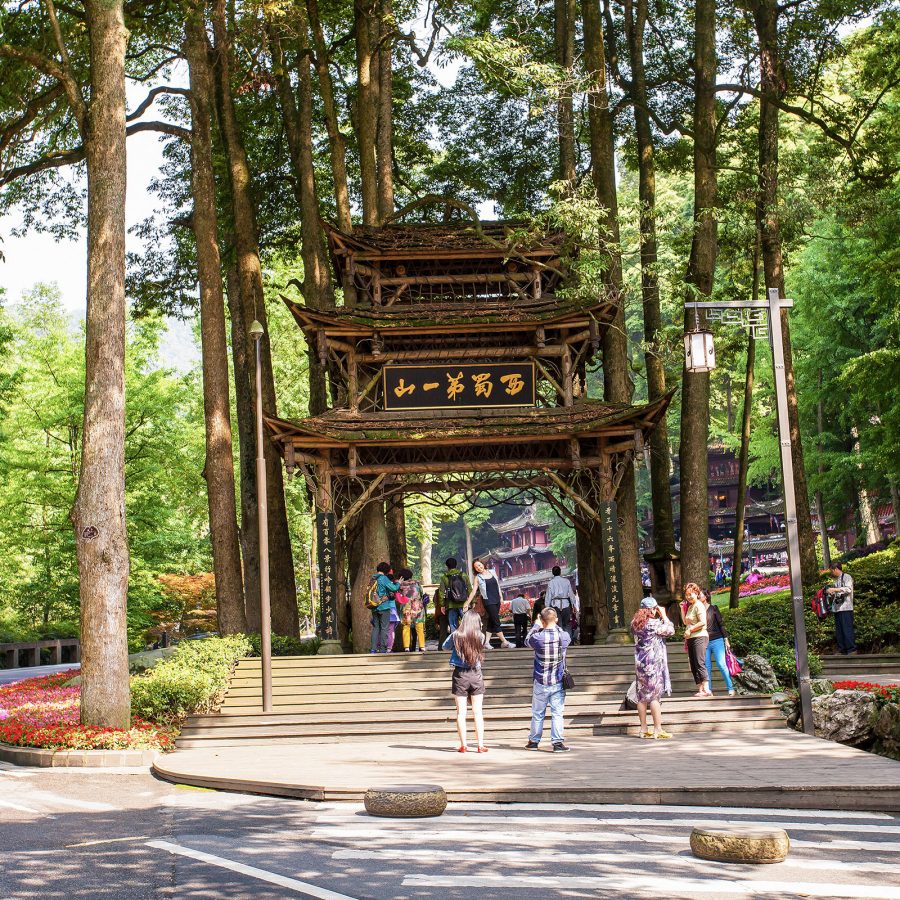
Credit: tupianlingang/Getty Images
Downtime done right
Whether it’s history or culture, Chengdu has no shortage of attractions.
Right next to Tianfu Square is the enormous Chengdu Museum , housing fascinating exhibits on the city’s history. Admission is free, but you’ll need to present your passport. If you want to try your hand at calligraphy while sampling dainty pastries, pay a visit to Wenshu Temple’s teahouse. Away from the centre, meanwhile, Chengdu Art Museum has two architecturally stunning galleries that showcase contemporary works.
If you have more time, head further outside the city. A little over an hour away is Sanxingdui, an archaeological site and museum with an extensive collection of artefacts that date back to the 12th and 11th centuries BC. An hour and half away lies Mount Qingcheng, one of the sacred Taoist mountains in China, where an easy forested hike awaits.

Credit: VCG/Getty Images
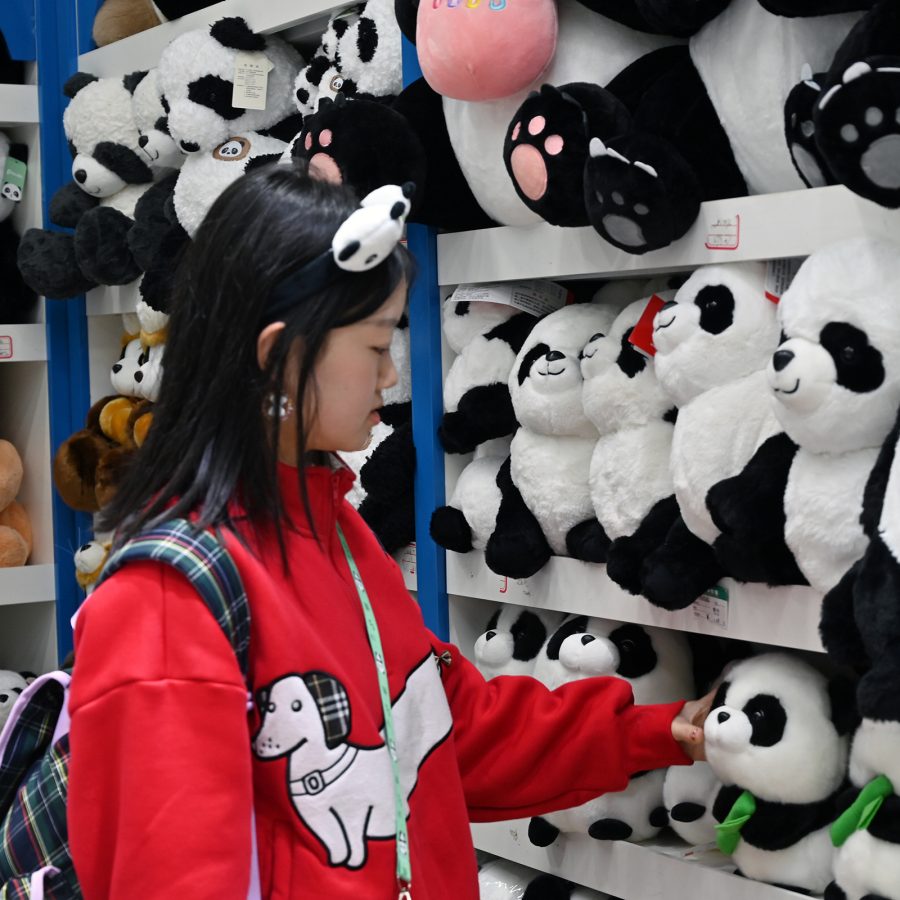
Credit:China News Service/Getty Images
Take something home
For quirky souvenirs, the gift shops in Chengdu’s many museums are unbeatable. Also not to be missed are the boutiques around visitor hotspots like Dali in Kuan Zhai Alley, which specialise in unique custom-designed Chinese jewellery that’s perfect for gifting.
For a taste of Chengdu, supermarket chains Walmart and Carrefour are treasure troves for affordable snacks. For local specialities like hot pot mixes, pop into one of the traditional food shops on Chunxi Road. In nearby Taikoo Li, Zhuyeqing is a great spot for picking up local teas.
More inspiration
Chengdu travel information
- China – the Chinese Mainland, Hong Kong SAR, Macao SAR and Taiwan Region
- Hong Kong SAR - English
- Chinese Mainland (China) - English
- Taiwan, China - English
- 香港特別行政區 - 繁體中文
- 中国內地 - 简体中文
- 中國��台灣 - 繁體中文
- Africa
- South Africa - English
- Asia
- Bangladesh - English
- Korea - English
- Singapore - English
- Cambodia - English
- 한국 - 한국어
- Sri Lanka - English
- India - English
- Malaysia - English
- Thailand - English
- Indonesia - English
- Maldives - English
- ประเทศไทย - ภาษาไทย
- Indonesia - Bahasa Indonesia
- Myanmar - English
- Vietnam - English
- Japan - English
- Nepal - English
- Việt Nam - tiếng Việt
- 日本 - 日本語
- Philippines - English
- Australasia
- Australia - English
- New Zealand - English








